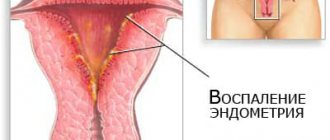November 8, 2021 Gynecology
If your period lasts for a month, what should you do? It must be taken into account that every woman’s body is individual. There is a period when the female body becomes more sensitive and vulnerable; this is the period of critical days. The menstrual cycle is cyclical changes in a woman’s body that have a pattern and are repeated after a certain period of time; the repetition period is different for all women.
During menstruation, the uterus contracts and thereby expels tissue and fluid from the body that were previously prepared to receive a fertilized egg. Each woman has her own menstrual cycle, the amount of blood loss and the duration of the cycle are individual for everyone. Some women lose so much blood that they may develop anemia.
The norm is menstruation, which lasts approximately 3 to 7 days. If menstruation has not yet established itself, then the body gets used to numerous changes, and the period of these days can be over 7 days. If the period of critical discharge is approximately 10 days, and the last few days are just spotty brown discharge, this is still considered normal.
At different periods of the menstrual cycle, the action of certain types of sex hormones predominates in a woman’s body. In the first half of the cycle, from approximately 1 to 14 days, these are estrogens; during the period of ovulation and until the next critical days arrive, these are progesterones. You need to know that cyclical changes in the ovaries are equal to changes in the uterus, therefore, in the first days, the lining of the uterus thickens, and nutrients accumulate in it, which will help nourish the embryo in cases of conception. If fertilization does not occur, then the inner layer is rejected, and as a consequence, menstruation begins.
What age-related changes occur after 40
40 years is a kind of milestone for the female body. Upon reaching this age, the performance of the ovaries will gradually deteriorate. It will become increasingly difficult to conceive a child, and over time, pregnancy will become completely impossible. This is due to natural factors.
After 40-42, menopausal changes begin to occur. Age-related changes rapidly change the performance of the reproductive system and the menstrual cycle itself. The following manifestations may indicate a change in hormonal levels:
- fluctuations in the duration of the menstrual cycle;
- change in the duration of monthly bleeding;
- change in the volume of blood released.
Menopause cannot occur before age 40. This can only happen under the influence of unfavorable factors.
As menopause progresses, periods can become more abundant. Usually this symptom disappears soon. If the violation is the result of menopause, then there is no need to worry. It is enough to regularly visit your gynecologist for prevention.
Periods may become heavier before menopause
The peak of menopause usually occurs at 44-45 years of age. It is during this period that symptoms are most pronounced. The follicle stops maturing monthly. There are regular delays.
You can recognize the course of menopause by the following symptoms:
- decreased physical potential;
- constant weakness;
- sleep disturbance;
- weight gain;
- heaviness in the legs;
- swelling;
- deterioration of hair and skin condition;
- the appearance of new wrinkles in large numbers;
- decreased skin elasticity;
- lack of appetite;
- heaviness in the legs;
- drying of the mucous membranes, including the vagina.
During this period, many are bothered by heaviness in their legs.
To reduce the intensity of menopause symptoms and normalize the volume of monthly discharge, maintenance therapy is required. Ovarian decline occurs gradually. The condition may be asymptomatic for a long time. The premenopausal stage lasts up to 5 years.
It is also important not to confuse menstruation with bleeding. The pad should not fill with secretions within an hour or less. If such a symptom is present, then you need to urgently call a doctor.
Non-dangerous causes of prolonged menstruation
Taking any measures to stop menstruation, which has been going on for a whole month, is strictly prohibited until the exact reasons for the deviation are established. It is worth immediately noting that they are not always associated with the presence of pathological processes. There are a number of relatively safe factors that can cause such a deviation. Let's look at the most common of them.
Taking COCs
One of the common reasons why menstruation lasts for a whole month is the use of oral hormonal contraception. Such drugs suppress the female body’s own production of sex hormones, as a result of which their quantity is significantly reduced. Instead, he gradually gets used to receiving synthetic hormonal elements, and this is a huge stress for him.
It's no secret that COCs have a powerful effect on hormonal levels. A shift in the menstrual cycle or a long absence of menstruation, menstruation that lasts for a whole month - all this may well be the result of prolonged use, irrational use or an incorrectly selected oral contraceptive. In any case, consulting a gynecologist under such conditions will not hurt.
Using an IUD
Intrauterine devices often cause a number of side effects in women. One of these may be abnormally long menstruation.
It should be borne in mind that such a deviation will not go away on its own, so it is important to contact a specialist and describe the situation in detail. Most likely, the IUD will have to be removed.
Sexual relations during menstruation
It would seem that the absurdity of the situation is understandable, but some girls do not deny themselves the pleasure of sexual relations even during “these” days. But it is better to refrain from such experiments, since the hormonal surge that occurs after sex can cause menstrual bleeding to drag on for a longer time. This, of course, is not dangerous, but you must agree that menstruation, which lasts for a whole month (albeit intermittently), is an unpleasant thing.
Childbirth
This is the safest cause of prolonged vaginal bleeding. Actually, postpartum discharge cannot be called menstruation. These are “suckers” - blood, with the help of which the young mother’s body is gradually cleansed of the remnants of the “children’s place” in the uterus. If your period continues for a month after childbirth, there is no need to worry - this is a completely normal physiological phenomenon.
What diseases can there be
An increase in abundance may be the result of the course of a pathological condition. Sometimes an increase in the volume of menstruation is the only symptom that must be noticed. Treatment can only be selected by a doctor.
The main pathologies that can lead to heavy periods are presented in the table.
| Endometriosis | The pathology is characterized by pathological growth of the uterus. A deviation can radically change the nature of menstruation. The intensity of the discharge is accompanied by severe abdominal pain. In addition, there are a large number of clots. Menstruation causes significant discomfort as it can last about 9-11 days. After 40 years, deviation poses a serious danger. There is a high risk of degeneration into a malignant process. The intermenstrual period gradually decreases. This occurs in the absence of treatment. Pathology depletes the female body. There is a high risk of developing anemia. |
| Myoma | This is a common disease among women over 40-43 years of age. This neoplasm is benign. However, this does not mean that the pathology does not require treatment. The formed compactions grow to the entire depth of the myometrium. Gradually the formations grow together. The disorder is usually caused by hormonal changes that are present during menopause. Another cause of pathology is abortions suffered in youth. Menstruation in pathology is characterized by excessive profuseness. A huge number of clots are observed. Critical days last up to 7 days. There is a high risk of bleeding. |
| Cancer | The incidence of cancer is increasing. The likelihood of developing pathology increases upon reaching 45-47 years of age. Late menopause may also be the root cause. At first, the deviation may be asymptomatic. The intermenstrual period will gradually decrease. The volume of blood lost increases. Critical days are accompanied by severe pain. Bleeding occurs periodically. Cancer must be removed surgically. |
| Endocrine disorders | The possibility of endocrine pathologies cannot be excluded. Malfunctions of the thyroid gland require consultation with an endocrinologist. Women are often diagnosed with diabetes. The deviation can also be a result of taking medications. |
All of these factors increase blood secretion. It is strictly forbidden to ignore possible pathologies.
If you want to know how to reduce the intensity of bleeding, then watch this video:
If no pathologies are found?
It happens that the examination did not reveal any pathologies, diseases, or disorders. In this case, long periods are simply an individual characteristic of the body. It's okay, everything can be fixed.
It is not at all necessary to lie still on “these” days, covered with pads. You just need to follow a special regime without prolonged stress and support your body with:
- quitting smoking, alcohol (strengthening blood vessels);
- herbal and aromatherapy (calming the nervous system);
- balanced nutrition (replenishment of minerals, trace elements, in particular iron);
- temporary restrictions on excessive physical activity (relieving muscle tension);
- regular sexual activity (well, this is in the break between “critical days”, strengthens the muscles of the pelvis and the entire reproductive system, and improves mood);
- drinking enough clean drinking water (blood is lost, and with it water leaves the body).
In general, the best treatment is prevention. Therefore, visiting a gynecologist once every 6 months is a very good prerequisite for recognizing troubles in time and a way to remain healthy, beautiful, feminine, and real for many years.
4 comments on ““12 main reasons for prolonged periods after 40 years””
Wow, so many possible reasons! I have a problem with both the thyroid gland and the adrenal glands. In general, at first I thought that if I was 41, then maybe it was early menopause for some reason. But a pelvic ultrasound revealed significant endometrial hyperplasia and sent me for urgent curettage. However, after drinking hemostatic burnet for a couple of days, I found a paid clinic with good doctors and did a hysteroscopy using modern equipment. I took a course of hormonal medications and the problem went away.
I read the article and somehow felt creepy. I don’t want to remember about my passport, but time passes. And then there are long periods after 40. I want to say that long periods at any age in a woman indicate some kind of malfunction in the body, you should definitely go to the doctor and under no circumstances self-medicate. And after 40, even more so - regular examinations by a gynecologist and self-monitoring of your health.
In principle, all the diseases described are possible in women much younger than forty; it’s not a matter of age as such. For example, I am twenty-six years old, I had long periods, as it turned out, due to large erosion of the cervix, plus a weakened immune system due to taking antibiotics (I was treating skin problems). After stopping the course of treatment only four months later, everything began to improve, and treatment of erosion (cauterization with liquid nitrogen) also had a positive effect.
There could be a whole lot of reasons. Firstly, this is a feature of the female body. Each of us often has a completely different cycle. Secondly, the duration of the cycle can be affected by stress or disturbances in the body. This should already encourage you to contact a specialist. After all, self-medication can only aggravate an already existing situation, and not help.
After 40 years, a woman is bothered by heavy or, conversely, scanty periods. In addition, pain may be present. The causes of heavy periods after 40 years can be both pathological and natural. The provoking factor can be determined using a comprehensive diagnostic examination. In addition, treatment is selected to prevent anemia and bleeding. Ignoring a violation that is present is strictly prohibited. Otherwise, complications will arise that will be much more difficult to cope with. Often the symptom is caused by age-related changes. Endometriosis and uterine fibroids cannot also be ruled out.
40 years is an important stage in a woman’s life
How does the deviation manifest itself?
It is important after 40 years to carefully monitor your well-being. It is necessary to see a doctor if:
- excessive bleeding, in which the pad fills more often than once every hour or two;
- the presence of a large number of clots or unclear sediment during menstruation;
- critical days lasting more than 7 days;
- reducing cycle duration;
- regular presence of spotting;
- severe weakness;
- loss of strength;
- nausea;
- severe dizziness.
The listed signs are a serious reason to consult a doctor. If your period turns into bleeding, you need to urgently call an ambulance.
How to diagnose
Treatment is prescribed only after a diagnosis has been established. For this, a woman is prescribed:
- examination by a gynecologist;
- taking a smear;
- blood and urine tests;
- MRI;
- Ultrasound;
- biopsy.
An MRI will help determine the cause of bleeding.
A set of examinations is selected individually based on the clinical picture. Self-diagnosis in this case is ineffective.
What to do if your period takes a long time
It is better to find out how to stop long periods from a doctor. This way you can avoid serious health problems. Common treatment options are oral contraceptives and hemostatic medications. In consultation with your doctor, you can take traditional medicine.
Birth control pills
Oral contraceptives can stop long periods associated with an imbalance of sex hormones. The drugs correct hormonal levels, and do not simply suppress bleeding. But if the hormonal status has changed due to a serious illness, treatment will proceed differently. Therapy is developed by a doctor on an individual basis.











